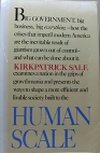Kirkpatrick Sale
Author of The Conquest of Paradise: Christopher Columbus and the Columbian Legacy
About the Author
Kirkpatrick Sale is the secretary of the E. F. Schumacher Society, a contributing editor of The Nation, and the author of nine previous books
Image credit: Uncredited photo from School of Cooperative Individualism
Works by Kirkpatrick Sale
The Conquest of Paradise: Christopher Columbus and the Columbian Legacy (1990) 303 copies, 3 reviews
Rebels Against The Future: The Luddites And Their War On The Industrial Revolution: Lessons For The Computer Age (1995) 255 copies, 1 review
Power Shift: The Rise of the Southern Rim and Its Challenge to the Eastern Establishment (1975) 24 copies
Emancipation Hell: The Tragedy Wrought By the Emancipation Proclamation 150 Years Ago (2012) 10 copies
Mother of All: An Introduction to Bioregionalism (Annual E. F. Schumacher Lectures Book 3) (1983) 3 copies
Associated Works
Tagged
Common Knowledge
- Canonical name
- Sale, Kirkpatrick
- Legal name
- Sale, John Kirkpatrick
- Birthdate
- 1937-06-27
- Gender
- male
- Nationality
- USA
- Birthplace
- Ithaca, New York, USA
- Places of residence
- Ithaca, New York, USA
- Education
- Cornell University (AB|History|1958)
- Occupations
- journalist
activist - Organizations
- Middlebury Institute
Members
Reviews
Lists
You May Also Like
Associated Authors
Statistics
- Works
- 24
- Also by
- 3
- Members
- 1,168
- Popularity
- #22,017
- Rating
- 3.8
- Reviews
- 9
- ISBNs
- 48
- Languages
- 4
- Favorited
- 1













